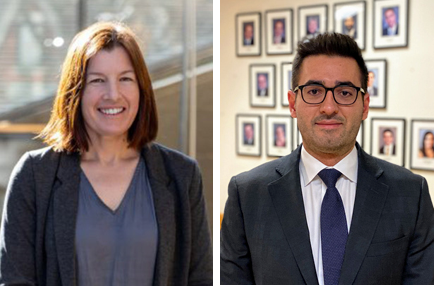Main Second Level Navigation
- Welcome
- Why Toronto?
- History of the Department
- Vision & Strategic Priorities
- Our Leadership
- Our Support Staff
- Location & Contact
- Departmental Committees
- Department of Medicine Prizes & Awards
- Department of Medicine Resident Awards
- Department of Medicine: Self-Study Report (2013 - 2018)
- Department of Medicine: Self-Study Report (2018 - 2023)
- Communication Resources
- News
- Events
DoM Physiatrists help Ukrainian rehabilitation hospital produce 3D-printed prosthetics

Since the onset of the war in Ukraine in February 2022, there have been over 10,000 Ukrainians seriously injured, requiring amputation of one or more limbs. With limited clinicians equipped to fabricate prostheses in the country and time constraints surrounding manual fabrication methods, limb loss patients have had difficulty accessing prostheses, with some travelling abroad to receive prosthetic limbs and rehabilitation – a task further complicated by difficulties navigating border restrictions.
Dr. Amanda Mayo is a Clinician in Quality Improvement (QI) Physiatrist at Sunnybrook Health Sciences Centre and Assistant Professor in the Department of Medicine at the University of Toronto (U of T). She completed medical school and her residency at U of T, and now specializes in amputee rehabilitation. Her current QI focus is on improving the continuum of care for individuals with limb loss, as well as preventing dysvascular amputations.
“U of T feels like home to me and I really like how collaborative we are within the Department of Medicine,” she says. “If you need something, there’s always somebody at U of T that can help you clinically or academically, and I have been blessed with great mentorship and resources by being a U of T faculty member.”
In the spring of 2022, Dr. Mayo and her team, including Dr. Peter Derkach, hospitalist at West Park Healthcare Centre, Jerry Evans, CEO of Nia Technologies, Dr. Myroslava Romach, Psychiatrist at Sinai Health System and Professor of Psychiatry at U of T, Dr. Steven Dilkas, Amputee Physiatrist at West Park Healthcare Centre and Assistant Professor of Physical Medicine & Rehabilitation at U of T, and Arezoo Eshraghi, certified prosthetist at West Park Healthcare Centre, connected with Unbroken – a rehabilitation hospital in Lviv, Ukraine that has provided medical help to more than 15,000 Ukrainians affected by the war. The group’s work includes reconstructive surgery, orthopedics and prosthetics.
Worldwide, the majority of amputations involve lower limb extremities resulting from complications of diabetes and/or vascular disease. However, traumatic war injuries can result in more complex limb loss cases such as short arm and hip level amputations from tourniquet use, gun shot wounds and explosive traumas. Recognizing that Sunnybrook is Canada’s leading trauma centre and a provincial centre for upper extremity and rarer types of prostheses, Unbroken turned to Dr. Mayo and her colleagues for their expertise.
“Traditionally, prosthesis production involves creating a manual plaster cast of the residual limb and using that to produce a prosthetic socket. This requires about eight hours of manual labour per socket, so you can imagine how much time that takes a medical team with such a high volume of complex cases,” says Dr. Mayo. “When we initially conducted a needs assessment with Unbroken, they expressed interest in learning how to 3D print prostheses in order to expand the capacity of their team.”
In the case of 3D printing, the residual limb can be scanned using a scanner on a tablet or phone and necessary modifications can be done on a computer to produce a digital socket. The prosthetic socket is then 3D printed in a matter of hours and doesn’t require hours of manual labour to produce. Another upside to 3D printing is that a digital file can be easily reprinted, where as if a manually produced socket is lost or broken, it will require another eight hours of labour to reproduce.
The objectives of the partnership were simple: increase prosthetic lab capacity, thus decreasing fabrication time and manual labour, and offer Ukrainians prosthetic fabrication and fitting in their home country.
In December 2022, Dr. Mayo received funding from the Temerty Faculty of Medicine at U of T’s Temerty Toronto-Ukraine Education and Collaboration Fund for this work. That same month, some of the team conducted an in-person visit to Unbroken’s medical facility in Lviv to survey and prepare the facility.
By June 2023, all of the necessary equipment had been delivered to Lviv.
“We sourced the 3D printers in Ukraine, which was challenging but will allow them to repair and replace parts more easily, and then the filament we ended up getting from other countries in Europe, so the only things we physically brought over were the iPads, laptops and software,” says Dr. Mayo.
In August 2023, the team returned to Lviv to begin training clinicians on how to use the equipment, and by October, Unbroken’s medical team was fitting patients with 3D printed sockets.
Today, Unbroken is independently producing 3D printed prostheses while Dr. Mayo and those still involved in the project continue to support them virtually.
“They are exceeding expectations,” Dr. Mayo says. “The team over there has been sending us videos of patients walking and running on the sockets they’ve produced and they’ve now reduced the timeline for socket production down to two hours, so they have become very adept. At this point, I think we can learn a few things from them as far as their digital workflow.”
